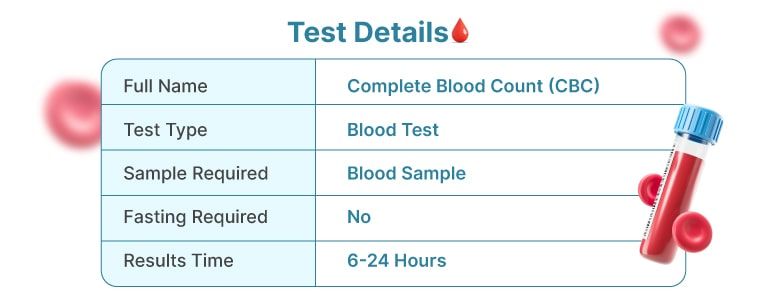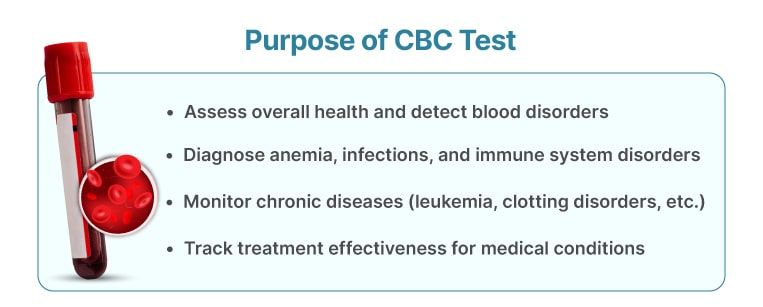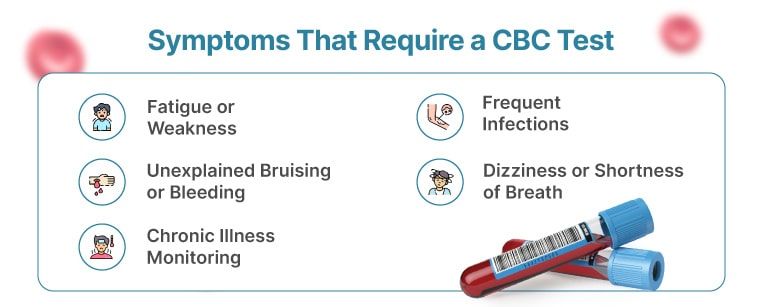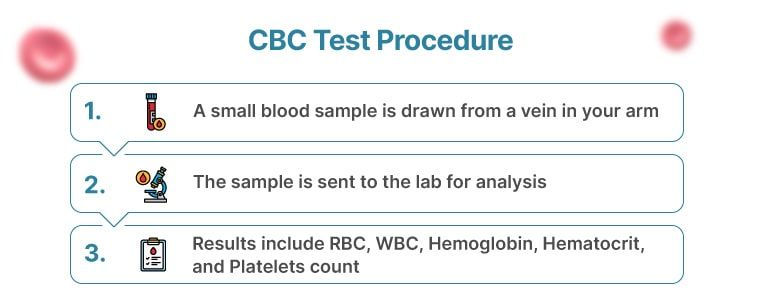CBC Test (Complete Blood Count)
No preparation required
 Test(s) Included (30)
Test(s) Included (30)
- CBC Test (Complete Blood Count)
30 tests included
About

BLOOD

Both

7 years & above
CBC Test - Price, Purpose, Range & Reports
Test Overview
| Sample Type | Blood |
| Reports Delivery | Earliest reports available within 10 hours |
| Price | 398 |
| Number of Tests Included | 29 |

What is a Complete Blood Count (CBC) Test?
A CBC Test (Complete Blood Count) is a detailed blood examination that measures and analyses different components of your blood. These include red blood cells, which are paramount for oxygen transportation; white blood cells, the guardians of your immune system; and platelets, essential for clotting.
A complete blood count test also measures haemoglobin, haematocrit (the percentage of red blood cells in your blood), and MCV (mean corpuscular volume, indicating the size of your red blood cells).
Doctors use a CBC Test to detect infections, anaemia, immune system disorders, and blood cancers. In different medical settings, it may be called a Complete Blood Profile (CBP), Full Blood Count (FBC), or simply a blood count test.
What is the Complete Blood Count (CBC) Test Price?
The CBC Test price varies based on several factors:
- Geographical Location: The CBC test price often differs from city to city. For example, it may be higher in metropolitan areas compared to smaller towns or rural regions.
- Laboratory Quality: Premium laboratories with advanced technology and certifications may charge a higher CBC test cost than smaller or less equipped labs.
Comprehensive Inclusions: Some diagnostic packages combine the CBC test with other tests, which can influence the overall CBP test price. - Test Demand: The CBP test cost can fluctuate based on its demand in specific locations or during particular times.
- Discounts and Promotions: Many labs offer seasonal discounts, promotional rates, or special prices for groups like senior citizens, which can reduce the CBC test cost.
Apollo 24|7 maintains a fair CBC Test price while ensuring reliable, high-quality results. It’s wise to compare prices in your city before booking.
What is the Purpose of a CBC Test?

A CBC test helps doctors assess an individual's health status. It gives a detailed picture of one's well-being by evaluating the different types of cells in their blood, including red blood cells, white blood cells, and platelets.
The primary purposes of a CBC test are:
- Diagnosis: CBC tests aid doctors in identifying the root cause of various symptoms, including fever, fatigue or breathing issues.
- Monitoring: Individuals battling chronic ailments like cancer, diabetes or AIDS can use CBC tests to gauge their health condition.
- Screening: Doctors often include CBC tests in routine health check-ups to spot potential health anomalies before they manifest as symptoms.
Who Should Get a Complete Blood Count (CBC) Test Done?

Typically, if there is a history of blood disorders in your family or you have exhibited symptoms such as fever, fatigue or shortness of breath, your doctor might advise you to undergo a CBC test. It is also highly recommended for those dealing with:
- Bleeding disorders
- Persistent infections
- Anaemia
- Blood cancers like leukaemia
Moreover, individuals with chronic medical complications like diabetes or AIDS regularly need CBC tests to monitor their health status. If you're on medication that could potentially alter your blood cell counts or have had bleeding issues in the past, regular CBC testing might become part of your healthcare routine.
Components of a Complete Blood Count (CBC) Test
Understanding the components of a CBC test is integral to comprehending your overall health status. A CBC test, which is commonly available at a range of prices depending on the lab and location, examines various aspects of your blood. Let's delve into each component to better understand what they measure and why they are significant:
- Haemoglobin (Hb): This component measures the amount of oxygen-carrying haemoglobin in your blood.
- Packed Cell Volume (PCV): This calculates the percentage of red blood cells in your bloodstream.
- Red Blood Cell Count (RBC Count): As the name suggests, this counts the number of red blood cells that transport oxygen throughout your body.
- Mean Corpuscular Volume (MCV): This gives insight into the average size of your red blood cells.
- Mean Corpuscular Haemoglobin (MCH): MCH quantifies the average amount of haemoglobin present in your red blood cells.
- Mean Corpuscular Haemoglobin Concentration (MCHC): MCHC calculates the average concentration of haemoglobin within your red blood cells.
- Red Cell Distribution Width (RDW): This component measures the variance in size among your red blood cells.
- Total Leucocyte Count (TLC): TLC provides a count of all white blood cells in your bloodstream that help fight diseases.
- Differential Leucocytic Count (DLC): DLC counts different types of white blood cells, each with unique functions ranging from fighting infections to triggering allergic reactions.
- Neutrophils: These are soldiers in your body's army against infections. They form the first line of defence whenever harmful bacteria or viruses enter your system.
- Lymphocytes: Another critical member of this defensive force, lymphocytes not only combat infections but also play a primary role in your immune response.
- Eosinophils: Eosinophils specialise in tackling parasitic invasions. Their presence generally increases when you have allergies or a parasitic infection.
- Monocytes: These cells are like the chameleons of your immune system. They mature into macrophages and help clear up infections by getting rid of foreign substances and dead cells in the body.
- Basophils: Largely involved in allergic reactions, basophils release chemicals that help control the body's response to allergens.
- Blasts: Think of these as baby white blood cells. Blasts show up when your body is busy producing new white blood cells to fight an infection or disease.
Pro-myelocytes, Myelocytes, Meta-myelocyte, and Bands: These are all stages in the life cycle of certain types of white blood cells. An increase in their number could indicate your body is working overtime to fend off an infection or illness. - Prolymphocytes: These are immature versions of lymphocytes. Their presence in high numbers may suggest certain types of lymphatic system disorders.
Atypical Cells: The presence of these abnormal white blood cells can hint towards a potential blood disorder. - Nucleated Red Blood Cells (NRBCs) per 100 WBC: This measures the number of immature red blood cells in your bloodstream.
- Corrected Total Leucocyte Count: This adjusts the total count of white blood cells for any abnormal or atypical cells present.
- Absolute Leucocyte Count: This component gives a count for each type of white blood cell in your bloodstream.
- Neutrophil Lymphocyte Ratio (NLR): The ratio of neutrophils to lymphocytes can indicate the presence of inflammation in your body.
- Platelet Count: Platelets are crucial for clotting and healing wounds. This component provides a count of platelets in your bloodstream.
The CBC test serves as a worthwhile investment into your well-being. Knowing all these components and their roles can help you better understand your CBC blood test report, giving you more confidence about your health-related decisions.

Understanding the Complete Blood Count (CBC) Test Report
Below are the desirable, borderline, and high ranges of the components measured by the CBC test:
| Component | Desirable Range | Borderline | High |
| Haemoglobin (Hb) | M: 13-17 g/dL F: 12-15 g/dL | Slightly below/above normal | M: > 17 g/dL F: > 15 g/dL |
| Packed Cell Volume (PCV) (Haematocrit) | M: 40-50.0% F: 35-44% | Slightly below/above normal | M: > 50.0% F: > 44% |
| Red Blood Cell (RBC) Count | M: 4.5-5.5 million/µL F: 4.2-5.4 million/µL | Slightly below/above normal | M: > 5.5 million/µL F: > 5.4 million/µL |
| Mean Corpuscular Volume (MCV) | 83-101 fL | 101-110 fL | > 110 fL |
| Mean Corpuscular Haemoglobin (MCH) | 27-32 pg | Slightly below/above normal | > 32 pg |
| Mean Corpuscular Haemoglobin Concentration (MCHC) | 31.5-34.5 g/dL | Slightly below/above normal | > 34.5 g/dL |
| Red Cell Distribution Width (RDW) | 11.6-14% | 14-15.5% | > 15.5% |
| Total Leucocyte Count (TLC) | 4,000-10,000 cells/µL | 10,000-12,000 cells/µL | > 12,000 cells/µL |
| Neutrophils | 40-70% | 70-80% | > 80% |
| Lymphocytes | 20-40% | 40-50% | > 50% |
| Eosinophils | 1-4% | 4-6% | > 6% |
| Monocytes | 2-8% | 8-10% | > 10% |
| Basophils | 0.5-1% | 1-2% | > 2% |
| Blasts | 0% | > 0% | Significant presence |
| Pro-myelocytes | 0% | > 0% | Significant presence |
| Myelocytes | 0% | > 0% | Significant presence |
| Meta-myelocyte | 0% | > 0% | Significant presence |
| Bands | 0-5% | 5-10% | > 10% |
| Prolymphocytes | 0% | > 0% | Significant presence |
| Atypical Cells | 0% | > 0% Significant presence | Significant presence |
| NRBCs/100 WBC | 0 | 0-1 | > 1 |
| Corrected TLC | Adjusted based on NRBC count | ||
| Neutrophils (Abs) | 2000-7,000 cells/µL | 7,000-10,000 cells/µL | > 10,000 cells/µL |
| Lymphocytes (Abs) | 1,000-3,000 cells/µL | 3,000-6,000 cells/µL | > 6,000 cells/µL |
| Eosinophils (Abs) | 20-400 cells/µL | 400-500 cells/µL | > 500 cells/µL |
| Monocytes (Abs) | 200-800 cells/µL | 800-1,000 cells/µL | > 1,000 cells/µL |
| Basophils (Abs) (Optional) | 20-100 cells/µL | 100-150 cells/µL | > 150 cells/µL |
| Neutrophil Lymphocyte Ratio (NLR) | 01-02 | 02-03 | > 03 |
| Platelet Count | 150,000-410,000 cells/µL | 410,000-450,000 cells/µL | > 450,000 cells/µL |
Note: The values of the components can vary based on laboratory, age, sex and underlying conditions.
Haemoglobin (Hb)
| High values may indicate | Low values may indicate |
High Haemoglobin levels can indicate excessive production of red blood cells Chronic lung disease or living in high-altitude areas. This can also be a sign of dehydration or certain blood disorders | Low levels usually indicate anaemia, which could be due to blood loss Nutritional deficiency Bone marrow problems Chronic illnesses like kidney failure |
Packed Cell Volume (PCV)
High values may indicate | Low values may indicate |
| A higher PCV suggests conditions like polycythaemia vera that lead to an excess production of red blood cells. | Low PCV may signal anaemia or blood loss. |
Red Blood Cell Count (RBC)
| High values may indicate | Low values may indicate |
| Elevated RBC counts can point towards polycythaemia vera or similar conditions causing excessive red blood cell production. | Low RBC counts suggest anaemia or blood loss. |
Mean Corpuscular Volume (MCV)
High values may indicate | Low values may indicate |
| High MCV values typically indicate macrocytic anaemia, often caused by vitamin B12 deficiency or folate deficiency. | Low MCV values hint at microcytic anaemia, usually caused by iron deficiency anaemia. |
Mean Corpuscular Haemoglobin (MCH)
| High values may indicate | Low values may indicate |
| High MCH levels could suggest macrocytic anaemia. | Low MCH values can indicate microcytic anaemia. |
Mean Corpuscular Haemoglobin Concentration (MCHC)
| High values may indicate | Low values may indicate |
| High MCHC levels can indicate macrocytic anaemia. | Low MCHC levels might be a sign of microcytic anaemia. |
Red Cell Distribution Width (RDW)
| High values may indicate | Low values may indicate |
| High RDW can be a sign of anaemia, particularly iron deficiency anaemia, or other conditions causing variation in red blood cell size. | Low RDW typically points out normal red blood cell size distribution. |
Total Leucocyte Count (TLC)
| High values may indicate | Low values may indicate |
| A high TLC count could indicate infection, inflammation or certain blood disorders. | Low TLC count also suggests similar issues. |
Neutrophils
| High values may indicate | Low values may indicate |
| High neutrophil counts could mean bacterial infections or inflammation. | Low counts could hint at neutropenia caused by infections or certain medications. |
Lymphocytes
| High values may indicate | Low values may indicate |
| High lymphocyte counts could indicate viral or chronic infections | Low values may suggest lymphocytopenia. |
Eosinophils
| High values may indicate | Low values may indicate |
| An increased count of eosinophils can be a sign of allergies or parasitic infections | Low values generally aren't significant but could be linked to conditions like autoimmune disorders. |
Basophils
| High values may indicate | Low values may indicate |
| Elevated basophil counts might indicate allergies | Low values are typically not significant. |
Blasts, Pro-myelocytes, Myelocytes, Meta-myelocytes, Bands and Pro-lymphocytes
High values may indicate | Low values may indicate |
| High counts of these could point towards serious conditions like leukaemia. | Lower-than-normal presence is usually not significant. |
Atypical Cells
| High values may indicate | Low values may indicate |
| Elevated counts can indicate infections or inflammation. | Low counts, however, are generally not significant. |
Nucleated Red Blood Cells (NRBCs) per 100 WBC
| High values may indicate | Low values may indicate |
| High NRBC counts could signal anaemia or bone marrow disorders. | Low counts are usually not significant. |
Corrected Total Leucocyte Count (TLC)
| High values may indicate | Low values may indicate |
| High corrected TLC values can also indicate infections or inflammation. | Low values could point towards the same conditions. |
Neutrophils
| High values may indicate | Low values may indicate |
| High values signify bacterial infections or inflammation. | Low values can be due to infections or certain medications. |
Lymphocytes
| High values may indicate | Low values may indicate |
| High lymphocyte values suggest viral or chronic infections. | Low lymphocyte values can be caused by infections, bone marrow issues or certain medications. |
Eosinophils
| High values may indicate | Low values may indicate |
| High values may indicate allergies or parasites. | Low values might not have any significant implications but can be observed in conditions like autoimmune disorders or particular infections. |
Monocytes
| High values may indicate | Low values may indicate |
| Elevated counts suggest chronic infections or inflammation. | Low counts might not have any significant implications but can be observed in conditions like autoimmune disorders or particular infections. |
Basophils
| High values may indicate | Low values may indicate |
| High counts indicate allergies or specific blood disorders. | Low counts might not have any significant implications but can be observed in conditions like autoimmune disorders or particular infections. |
Neutrophil Lymphocyte Ratio (NLR)
| High values may indicate | Low values may indicate |
High NLR values suggest severe diseases or inflammatory disorders. They can also point towards physiological stress or specific blood disorders. | Low NLR values usually indicate normal conditions |
Platelet Count
| High values may indicate | Low values may indicate |
| High values can suggest platelet activation, inflammation or certain blood disorders. | Low values can be due to thrombocytopenia, which can be caused by blood loss, bone marrow issues or specific drugs. |
Preparation and Procedure for Complete Blood Count (CBC) Test

Preparation and Procedure for Complete Blood Count (CBC) Test
There are several reasons why your doctor would recommend a CBC test to you. So, if you have been advised by your doctor to take one, it's important to follow certain procedures to prepare for the test. Let's simplify this and understand how to prepare for this test and what the procedure involves.
A. How is a CBC Test Conducted?
The CBC test essentially analyses your blood. Here's how it is done:
- Preparation: First off, the area from where the blood is to be drawn, typically on the inside of your elbow or back of your hand, is cleaned thoroughly with an alcohol swab or iodine solution. You would be asked to sit comfortably or lay down reclining for the procedure.
- Blood Draw: A trained technician inserts a sterile needle into your vein and collects the blood sample in a vacuum-sealed test tube attached to the needle. It's a quick process and once sufficient blood has been collected, the needle is carefully withdrawn.
- Post-Procedure: A small bandage is applied to the puncture site. Post-procedure, you might be asked to rest for some time to ensure you're feeling well before you leave.
B. Is Fasting Required for a CBC Test?
Generally, no special preparation like fasting is needed unless specifically instructed by your doctor. This instruction may come if your blood sample will also be used for other tests that require fasting. If such is the case, you may need to abstain from eating or drinking anything except water for about 12 hours before the test.
C. When Should I Take a CBC Test?
There's no hard and fast rule as to when during the day you should undergo a CBC test. However, medical professionals generally advise taking it first thing in the morning when our blood cell count levels are at their most normal state.
D. How Often Should I Have a CBC Test?
The frequency of undergoing a CBC test largely depends on your health status and doctor's advice. It is usually part of routine health check-ups or ordered when you're experiencing symptoms suggestive of conditions that could affect your blood cells. Your family doctor would be in the best position to guide you about the frequency that suits your specific circumstances.
Booking a CBC Test Online & Checking Reports
Booking a CBC test online and accessing the results has been made easier than ever with Apollo 24|7. Here's a simple guide to help you through this process.
A. What are the Steps to Schedule a CBC Test on Apollo 24|7
- Begin by visiting the Apollo 24|7 website or smartphone app and selecting "Lab Tests" from the top menu.
- Using the search bar, type in "Complete Blood Count (CBC)". Alternatively, you can locate it via the listed categories. You may also find it listed under CBC test synonyms such as Complete Blood Profile (CBP), Full Blood Count (FBC), or blood count test, depending on the platform or laboratory.
- After clicking on "Complete Blood Count (CBC)", select "Book Now" and fill in your personal details.
- Next, select your preferred location for sample collection, along with your convenient time slot.
- Review your booking details and proceed to make the payment online. The CBC test price is competitive, making it affordable for all.
- Upon payment confirmation, you will receive an SMS detailing your appointment information.
B. How do I Access my CBC Test Results Online on Apollo 24|7?
Once your blood sample has been examined, you will be notified via an SMS.
- To access your report, log into your Apollo 24|7 account and head to the "Reports" section.
- Find and click on "View Report" next to your CBC test.
- Your detailed CBC test report will then be available
 Frequently Asked Questions (FAQs)
Frequently Asked Questions (FAQs)
What is CBC and its normal range?
CBC stands for Complete Blood Count, a common blood test that measures different components of the blood including red blood cells (RBC), white blood cells (WBC), and platelets. Normal ranges vary but generally include: RBC 4.5-5.5 million/µL for males and 4.2-5.4 million/µL for females, WBC 4,000-11,000 cells/mcL, and platelets 150,000-450,000 cells/mcL.
What lifestyle adjustments should I consider before undergoing a CBC test to ensure the most accurate results?
For a CBC test, there are usually no specific lifestyle changes required. However, you must inform your doctor about any medication or supplements you're currently taking because some medicines might influence your blood count. It's always recommended to stay hydrated, get enough rest and maintain a balanced diet.
If my CBC test results fall outside the normal range, what are the next steps? Should I consult a specialist or make specific lifestyle changes?
If your CBC test results fall outside the normal range, it doesn't necessarily mean you have a health condition. However, you should consult your doctor or a specialist who can interpret the results accurately and guide you on the next course of action. It could involve further testing or specific lifestyle changes based on what they find.
Are there any alternative or complementary tests to consider alongside a CBC test for a more comprehensive assessment?
Yes, alongside a CBC test, other tests like a blood chemistry panel, coagulation tests, and genetic tests might also be recommended by your doctor for a comprehensive assessment of your health.
Can children or adolescents benefit from a CBC test, and if so, at what age should it be initiated?
Yes, children and adolescents can benefit from a CBC test. It helps in diagnosing conditions like anaemia and infections early on. The timing of the first test depends on individual health circumstances and it is best decided by your family physician.
How often should I review or retest my CBC test, especially if I've made lifestyle changes or started medication?
The frequency of CBC tests varies depending on individual health conditions and any medication you're taking. Generally, a yearly test during an annual check-up is common. However, if you've made significant lifestyle changes or started new medication, your doctor may recommend more frequent testing.
Are there any emerging technologies or advancements in CBC test that I should be aware of?
In recent years, the CBC test has been improved with automated and digital microscopy which provides quicker and accurate results. Keep in touch with your doctor or lab technician to know about the latest advancements.
What role does genetic testing play in a CBC test, and when might it be recommended alongside traditional testing?
Genetic testing can be valuable in diagnosing certain genetic disorders that may affect blood cell count. It could be recommended alongside a CBC test if initial results are abnormal or if there's a family history of blood disorders.
Can I drink water before a CBC test?
Yes, you can and should drink water before a CBC test as it aids in blood draw. However, avoid drinking excessive amounts as it might dilute your blood sample.
Can CBC detect all cancers?
No, a CBC test cannot detect all cancers. However, it can help identify problems such as anaemia or infection which could be symptoms of certain types of cancer.
What is a Complete Blood Count Test used for?
A CBC test is used to assess overall health and detect a variety of disorders, such as anemia, infection, and many other diseases.
Is CBC a definitive test?
No, a CBC is not a definitive test. It provides general information about your health but may require further tests to diagnose specific conditions.
How much does a full CBC cost?
The cost of a full CBC test can range from Rs.335 to Rs.385, depending on the healthcare provider centre and location.
Is a CBC a normal blood test?
Yes, a CBC is one of the most common and routine blood tests used to assess overall health.
Why is a CBC test required?
A CBC test is required to monitor health, diagnose conditions like infections, anemia, or blood disorders, and assess how well organs like the liver and kidneys are functioning.
General Physician/Internal Medicine
Book Popular Tests at Home
Hba1c (glycated Hemoglobin) | Cholesterol - Serum | Complete Urine Examination (cue) | Glucose, Fasting | Glucose, Random | Creatinine - Serum | C-reactive Protein (crp) - Quantitative | Culture And Sensitivity - Urine (automated) | Prothrombin Time (pt/inr) | Erythrocyte Sedimentation Rate (esr) | Beta Hcg (total) | Uric Acid - Serum | Electrolytes - Serum | Urea And Creatinine | Blood Group Abo And Rh Factor | Ferritin | Vitamin B12 | Hbsag Screening - Rapid | ProlactinBook CBC Test (Complete Blood Count) Test in Other Cities
Cbc Test (complete Blood Count) in Delhi | Cbc Test (complete Blood Count) in Noida | Cbc Test (complete Blood Count) in Faridabad | Cbc Test (complete Blood Count) in Gurugram | Cbc Test (complete Blood Count) in Ghaziabad | Cbc Test (complete Blood Count) in Hyderabad | Cbc Test (complete Blood Count) in Bangalore | Cbc Test (complete Blood Count) in Kolkata | Cbc Test (complete Blood Count) in Chennai | Cbc Test (complete Blood Count) in Mumbai | Cbc Test (complete Blood Count) in Ahmedabad | Cbc Test (complete Blood Count) in Pune | Cbc Test (complete Blood Count) in Lucknow | Cbc Test (complete Blood Count) in Vizag | Cbc Test (complete Blood Count) in VijayawadaBook Popular Packages with Apollo
Apollo Prime Health Plan | Apollo Thyroid Assessment - Basic | Apollo Vitamin Check - Basic | Apollo Diabetes Panel - Basic | Apollo Full Body Check - Advance IWhy should Apollo be your preferred healthcare partner?
- 40 Years of legacy and credibility in the healthcare industry.
- NABL certified multi-channel digital healthcare platform.
- Affordable diagnostic solutions with timely and accurate test results.
- Up to 60% discount on Doorstep Diagnostic Tests, Home Sample Collection.
- An inventory of over 100+ laboratories, spread across the country, operating out of 120+ cities with 1200+ collection centers, serving over 1800+ pin codes.
The information mentioned above is meant for educational purposes only and should not be taken as a substitute to your Physician’s advice. It is highly recommended that the customer consults with a qualified healthcare professional to interpret test results


